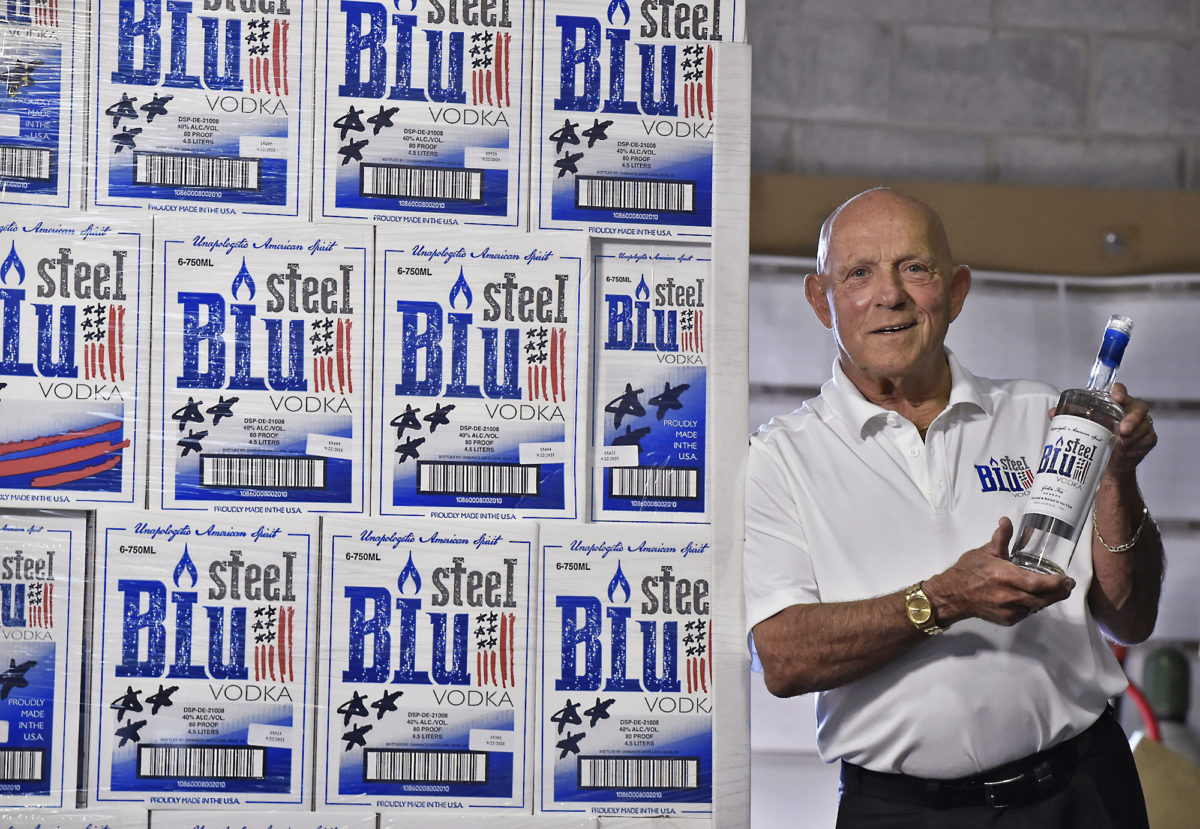Delaware-based Steel Blu Vodka strives to build its reputation in a crowded field
Photos by Butch Comegys

Steel Blu is now available in Delaware, Maryland and Washington, D.C.
Think alcoholic beverage production in Delaware and minds immediately leap to Dogfish Head Brewery — not quite ground zero of the craft brew revolution but not far off. Dogfish Head’s exponential expansion from a kitchen table experiment involving cherries to the behemoth it is today is the stuff of legend.
DFH’s success can also be measured in the dozens of breweries now scattered over Delaware today. But beer isn’t the only game in the state.
In 2013, Painted Stave brought a similar craftsman’s approach to the distilling of fine spirits in Delaware. Being the first in the first state, they had to help rewrite local laws, paving the way not only for their success but for future liquor distilleries within the state.
Taking advantage of this opening, a new spirits company out of Bear has been quietly producing vodka for the last two years and gaining traction in the local market. Though their beginnings have been small and unceremonious — much like Dogfish Head before them — Steel Blu Vodka also has its sights set on a national marketplace.
People whisper about the origin story of Steel Blu Vodka as if it is a secret, but the truth is as unsurprising as a local restaurateur who loved vodka-soaked cherries (a fruit that is making its refrain known in local lore) and dreamed of funding a vodka distillery. For Domenico Procope, it was a dream come true.
Vodka is a clean spirit, with the kind of versatility that makes it the most popular spirit in the world. It is created by converting any foodstuff that contains sugar or starch into alcohol through fermenting and distilling. During Prohibition, resourceful folks wishing to skirt legality, concocted recipes using what was on hand — mostly grains in this region.
To test the quality of the moonshine, bootleggers would take a flame to their product. If the batch was of superior quality, it would produce a light blue flame. From this story Steel Blu Vodka took its name, and if one thing defines the brand, it is that goal of superiority. Like Tito’s, the top-selling vodka in the U.S., Steel Blu makes its vodka from corn. They employ a hand-crafted process, distilling the vodka six times to produce a signature smoothness.
Now, two years into their business plan, Steel Blu Vodka is available in Delaware, Maryland, and Washington, D.C. The last market came into realization specifically because Delaware’s legislators to the U.S. Congress wanted a product made from their own state available to them in the D.C. market.

Biagio Procope, an apprentice distiller for Steel Blu, works the labeling machine at the company’s Bear distillery.
Those markets are just the beginning of a dream to go national. Steel Blu is working to expand into New Jersey next. They are growing slowly, making sure they have the capacity to support each market as they go. It is still a handcrafted process, from start to finish.
The company recently automated the labeling process. Previously, they were putting every label on every bottle by hand. Steel Blu is also looking to expand its line to include its first flavored vodka — no, not the sentimental favorite cherry — but orange, a choice reached through careful analysis of the marketplace.
Joe Ross, a special accounts manager who has been at Steel Blu since its inception, explains the methodical growth.
“We want to be sure of our footprint,” Ross says. “That we are well-placed. That our in-Delaware market is strong. Our whole approach is to develop a brand that people are asking for [by name].
“Before we ever bottle the current Steel Blu Vodka, we do blind taste testing with an excess of 2,000 people with six vodkas before them — our vodka and five of our competitors. We’ve done extremely well in side-by-side comparison. Our vodka has been quite favorably rated by our panels.”
Kelly Minemier, an on-the-ground sales development rep for Steel Blu, attests to the enthusiasm for the product when she gets it in front of potential customers.
“People describe our vodka as ‘clean and smooth’ when they taste it,” Minemier says. “And when they find out it is locally made, they make it a point to support us.”
With such a positive reception from those who have tried it, the success of the brand will come down to marketing. This month, the company hired a new marketing director with hopes of increasing brand awareness in existing markets and forging new paths to consumers in future markets.
However, though the company has national aspirations, Steel Blu strives to be a community business: partnering in efforts for a vibrant local restaurant scene, participating in charity events and supporting other local businesses with their endeavors. When the pandemic hit, Steel Blue was still in its first year of production, but the company switched production from vodka to hand sanitizer — a scarce commodity at that time. They could have charged a premium for their product, but instead delivered their sanitizer free of charge to local hospitals, police stations, fire stations, restaurants, and liquor stores.
“Steel Blu is a small, family-run business,” says Minemier. “It was important to us, right from the start, that we implement a culture of service, family, and community.”
— You can find Steel Blu at many local restaurants and bars and at area liquor stores. Try it in your holiday themed cocktails or give it as a gift. (Out-of-state relatives will be impressed.) For more info, go to SteelBlu.vodka





